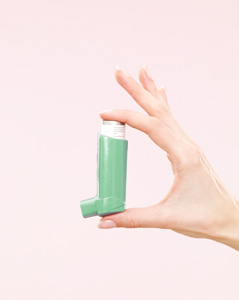
Do you or does a loved one have asthma? Learn how to take control to limit attacks and ease them when they happen.
When you have an asthma attack, the walls of your lungs' airways swell, making less room for air. Mucus also reduces airflow.
Your body gets less oxygen during an asthma attack.
Symptoms can include:
• Coughing.
• Tightness in the chest.
• Wheezing.
• Being unable to do regular activities because you're short of breath.
• Feeling tired.
The causes of asthma attacks can be different for everyone. Common triggers include:
• Pets.
• Tobacco smoke.
• Mold.
• Dust mites.
• Cockroach allergen.
• Outdoor air pollution.
• Smoke from burning wood or grass.
• Infections like the flu.
Limit your exposure to these triggers. Try to eliminate triggers in your home to create an environment where asthma attacks are less likely.
To get the most out of your medications, be sure to:
Stick to a medication routine. Controlling your asthma daily may include prescription medications such as corticosteroids. They can reduce inflammation and mucus production in your lungs. Take your medications regularly. Over time, you'll have fewer and milder attacks. To stop a sudden asthma attack, use your quick-relief or emergency inhaler.
Plan ahead. When you leave home, bring your quick-relief inhaler. Let people at school or work know that you have asthma and may need help if an attack occurs.
Exercise safely. Quick-relief inhalers may be recommended for use before and after you exercise to avoid an attack. Talk to your doctor about what you should do.
To stop an attack, take action right away:
• Use your quick-relief inhaler as soon as you start feeling symptoms. To use it, shake the inhaler 10 to 15 times, breathe deeply in and out, then put the inhaler between your lips to get a good seal. Start to slowly breathe in before you depress the inhaler, and continue breathing in slowly while you depress it and after you release it. Hold your breath for 10 to 15 seconds and then breathe out slowly through your mouth.
• Call 911 or go to the emergency room if breathing is still very hard after taking your meds.
Sources: American Lung Association; Centers for Disease Control and Prevention; National Heart, Lung, and Blood Institute